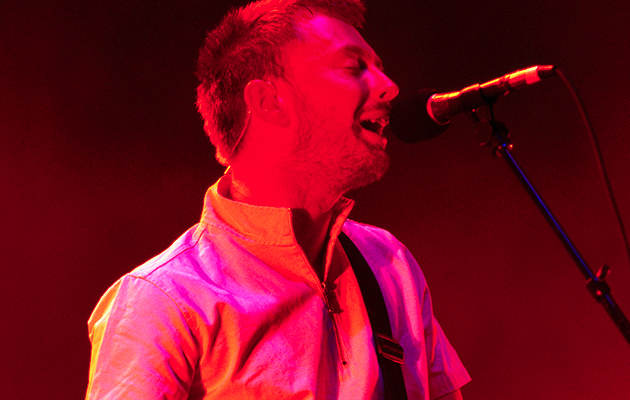"We thought we were trapped in one of those Twilight Zone slow time machines…" With Amnesiac, their second smash hit album of uneasy listening in just over six months, at the top of the charts on both sides of the Atlantic, Radiohead are even more determined to retain their anonymity. As for Thom ...
OK Computer matched critical acclaim with commercial clout, going gold in the US (500,000 sales) and platinum in the UK (also 500,000) before Christmas. It topped almost every end-of-year album poll and was even voted the best album ever by one rock monthly. But once again, a more conventional rock’n’roll success story – The Verve – beat Radiohead at the Brits in February 1998. As consolation, the Oxford misfits still picked up two Ivor Novello songwriting awards and a Grammy for Best Alternative Rock Performance.
Radiohead toured OK Computer around the world and into immortality. Along the way, Yorke guested on the UNKLE album, Psyence Friction, with DJ Shadow, while he and Jonny recorded three Roxy Music covers for the Velvet Goldmine soundtrack. Band tension was never far away, though Yorke claimed at the time, “We’re much better at shouting at each other now, which is good. There used to be a lot of serious in-fighting under the guise of reasonable discussion, and now it’s lots of shouting and eventually we decide, so that’s kind of cool. It’s sort of like a marriage.”
A marriage heading for divorce, judging by Grant Gee’s Radiohead tour documentary, Meeting People Is Easy. Premièred in November 1998, this queasily beautiful tapestry of millennial unease was the Koyaanisqatsi of rockumentaries. Mimicking the shifting textures and gear-crunching tempo changes of OK Computer, Gee’s film caught the mind-warping mundanity and motion sickness of life on the road with a homesick, paranoid, psychologically scrambled art-rock quintet.
“He did so many edits of it,” says Colin Greenwood. “This hot summer in London, this tiny room, we saw hundreds of them. The poor man. We ended up with over eight hours of edited footage from 40-odd. It was a mammoth undertaking – the heartache! But for all that stuff that you saw, there was all this paddling about in the sea in New Zealand and going to barbecues and getting wasted and go-karting – but no-one wants to see that. It confirmed what everybody likes about us anyway.”
Despite the multiple re-cuts, Gee was given a mostly free hand by the band. “We saw it before editing, and bits and pieces that felt like too much were taken out,” Yorke explains. “Equally we kept saying to him, ‘Can we have some light bits?’ He was going, ‘No.’ Hurg hurg!”
Indeed, the film somehow failed to capture Radiohead’s naturally sunny, bouncy, happy-go-lucky side. “The idea really was to sort of burn out that element of the myth really, or the glamour bit,” Yorke adds glumly. “The actual brutal reality when you turn your domestic digital camera on and film somebody backstage before a show is a bit like Meeting People Is Easy. It’s kind of supposed to be a rough guide on reasons not to be in a band.”
Featuring teasing snippets of future Kid A and Amnesiac tracks, the film also caught Britain’s most neurotic band on the verge of a nervous breakdown. “It was Radiohead, wasn’t it?” Colin smiles feebly. “Eddie Izzard would do a good pisstake.”
One scene in Meeting People Is Easy finds Yorke berating his fellow band members about the “headfuck” brought on by OK Computer, dismissing the acclaim as “bollocks” and concluding, “We should get out while the going is good.”
Was it really that stressful? “It wasn’t stress, it morphed into something far more interesting,” grins Yorke, rocking gently in his seat. “I don’t know what. Totally out of control, almost like hallucinating all the time. It was great.”
After OK Computer, Radiohead were proclaimed the most important, forward-looking band since The Beatles. Radiohead’s third album was one of the most hysterically praised releases in rock history, earning the band a global popularity rating somewhere between The Beatles and Jesus. How did Yorke react? It was a “total headfuck”, a “fucking nightmare”, he became “totally unhinged”.
At the peak of their career, Radiohead were a quivering mess of sickness and insecurity. It was time to rethink the band – or get out of the game altogether.



